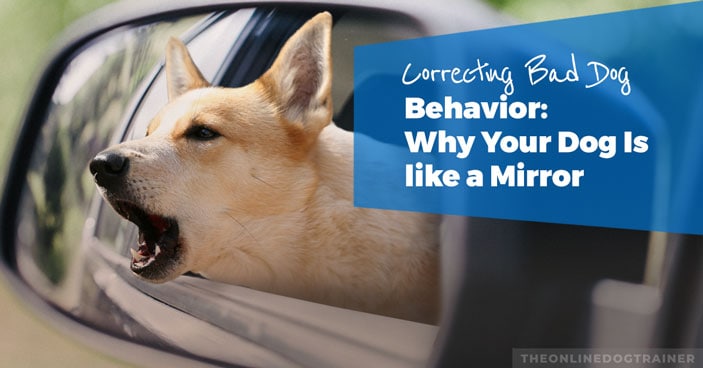
A lot of people ask me, how do I train my dog? Or even more important, how do I go about correcting bad dog behavior that already exists? And the answer is always this.
When it comes to training a dog it’s important that we first start with a solid foundation. That’s where you get the dog to listen to you, get them to calm down, focus on you and where you “win the dog’s mind.”
After this you can apply the training side of things where you explain to the dog what you are wanting. And then you ensure that there is consistency in the household with how people are interacting with the dog.
However the subtle part, the part that many people dismiss or fail to realise the power it holds is the energetic side of our relationship.
By energetic I mean, “The Way” that we do everything, how we interact with our dogs and how we are feeling.
It’s so easy to say to ourselves, “Oh my dog doesn’t really understand how I’m feeling” or “My ongoing frustrations at work doesn’t really effect my dog” however over the years I’ve come to realise that our dogs really do pick up on our energy and are greatly affected by our moods.
You see, our dogs are like a mirror to our souls.
They are a reflection of us, and can act like a mirror which means that very often… we are the problem and we are the solution to our dog problems!
If we are angry, short-tempered, or have anxiety, a dog is likely to reflect the same type of behavior. On the other hand, if we are cool, calm and relaxed, we’re more likely to have a dog that mirrors that behavior and that is calm.
So, in this blog post I want to share with you what I believe are the key parts to developing an amazing bond with your dog, and then look a little deeper into this subtle area of how our dogs reflect our energy.
THE FOUNDATION:
Before we move into the area of energy, we need a solid foundation. And in order to build the foundation, there are some very practical steps that we need to take in order to gain the respect and trust of our dogs. This includes how we feed our dogs, who controls the food, how we greet dogs, interact with dogs and walk dogs.
These are the most important practical aspects of our relationship with our canine counterparts. We have to understand how to calm our dog’s mind down, get him to focus on us, and know that we’re making the decisions. That’s the key, and to be honest, that’s a large part of what I share with people inside my program, The Dog Calming Code.
Like I mentioned earlier though, building a foundation isn’t the only important part.
CONSISTENCY:
Another key aspect is consistency, which is quite boring to most people! It means everybody’s got to stick with the plan. It’s not like we’re training a new behavior because your dog has a disease, and once the disease is gone, we can go back to doing the wrong training.
You, and everyone else that plays a large part in your dog’s life, have to stick with the right training if you want to achieve the best results.
TRAINING:
The part that many people start with is the training, and this, in my opinion, is a big mistake. Without a solid foundation in place, the training will not work long-term or when you or your dog is under pressure. So, before we get to this step, we do have to have a solid foundation in place first.
So, what exactly is ‘training’? Well, for example, if we don’t want our dog to come in the kitchen, we need to do a little bit of work showing them exactly where the kitchen starts and finishes. For example, this could include putting some builders sticky tape on the floor for a period of time. Then we can do the training, showing them, ‘Good dog’ for staying out, and ‘Nope, this is what happens to you if you come in the kitchen.’
That’s the training.
Every step I just mentioned is important, but today I want to focus on the subtlest side of building an amazing relationship with your dog, which is how our emotions and feelings can affect our dogs. It’s a step that a lot of people miss, and it’s a fundamental, very powerful part. The energy side of things takes into account how you act, how you do things around your dog, how you are feeling and what you are thinking…it all impacts your pup.
The bottom line is that how you behave around your dog has a massive impact on how your dog behaves. Your dog is your mirror…he reflects you.
The best way I can put it is your dog is like a sponge. To see what I mean by that, take a quick look at a video I created just for you on the topic…
Pretty interesting, isn’t it? I know that I personally am constantly in awe of how smart and sensitive our canine companions are.
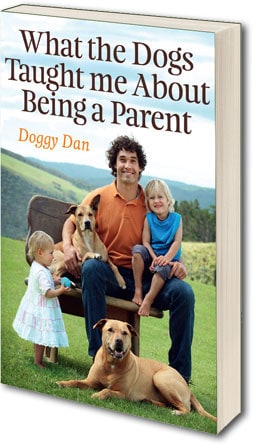 In fact, it’s so interesting to me that in my book, What the Dogs Taught Me About Being a Parent I wrote an entire chapter about how dogs (and kids) soak up our energy and the implications that different types of energies have on your dog.
In fact, it’s so interesting to me that in my book, What the Dogs Taught Me About Being a Parent I wrote an entire chapter about how dogs (and kids) soak up our energy and the implications that different types of energies have on your dog.
If your dog is hanging around in a place where there’s always screaming and shouting or lots of noise, your dog is unlikely to be a dog that spends most of his time lying in the corner totally chilled out and half asleep.
However, if you live on your own in a very quiet part of the country and you’re very soft-spoken and mild-mannered, you’re far more likely to have a dog who is more chilled out, relaxed and less reactive!
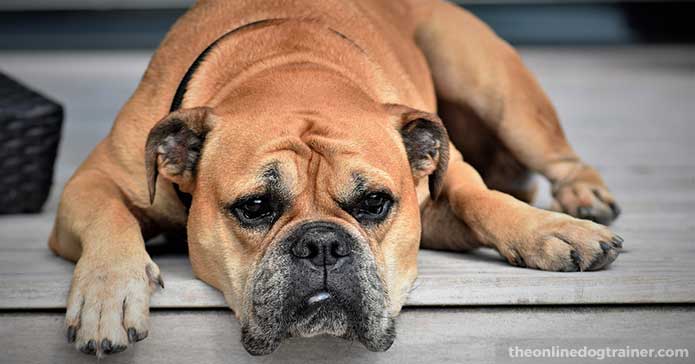
The concept seems fairly simple, but there is one thing I want to make clear…
The biggest mistake I hear is that people assume that if they have a dog who’s biting and aggressive, it means they are an aggressive person who goes around fighting and biting people.
The correlation is NOT that direct!
If you have an aggressive dog, it doesn’t necessarily mean that you are an aggressive person. Instead, it’s quite possible that you have a lot of frustration or resentment regarding your work or home life, or maybe you are wanting to lash out about something in your life. Your dog can pick up on that frustration and pent-up anger, and then it has to go somewhere.
The bottom line is that it’s very hard to hide how we really feel from our dogs!
How dogs are able to pick on this energy, I don’t fully know, but they certainly do. And boy, are they good at it!
Another thing to think about is how much energy your dog is capable of soaking up.
Some dogs are little sponges, while others are big sponges that can tolerate soaking up more energy. (And it has nothing to do with the dog’s physical size!)
Regardless of how much energy your dog can soak up, eventually he’s going to say, ‘I’ve had enough,’ and the energy will start to overflow.
So, it might be that you’re frustrated with work and your dog soaks in that energy. When you take him down to the park after he’s soaked in that energy, he may become frustrated and irritable, which causes him to snap at you or another dog.
This might leave you wondering, ‘Why did my dog react that way’?
It’s simply because your dog is picking up all that energy you’re pouring out and he just can’t take it anymore and has to let it out.
As you’ve seen in the video above, my lovely dog, little Inky-tinky couldn’t soak up much before she was showing signs that things weren’t good.
On the other hand, my dear dog Peanut could soak up an awful lot.
At the end of the day, my dogs are not perfect. I’m not perfect. My wife’s not perfect. And our kids aren’t perfect.
But, my family is all very aware of how our energies influence our dogs… And being aware of it is the first stage of learning.
It’s vital that each day we take an internal look at ourselves and think about how we change both on a practical level and a spiritual or mental level to help our dogs control their behavior.
As the saying goes… ‘It’s not what you do but the way that you do it.’
It’s the way you do things that truly matter. You can be quite rude in asking somebody to help, or you can be very polite in asking somebody to do the same thing, and you get a totally different response.
This is so important to understand. In fact, it’s so important to me that I want to give you the audio chapter about how dogs mirror our behavior from my book, completely free!
I know will find this information very helpful as you seek out the solution to correcting bad dog behavior and helping your dog relax, calm down and listen to you more consistently.
Enjoy, and as always, love your dog!

~Doggy Dan 🙂


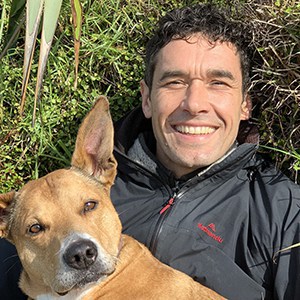

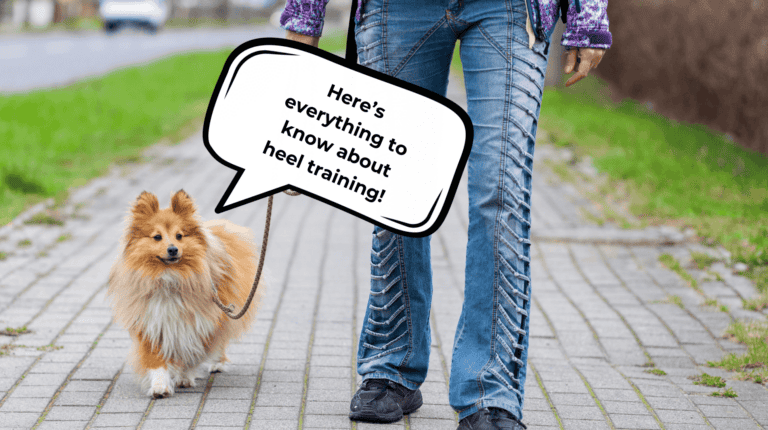
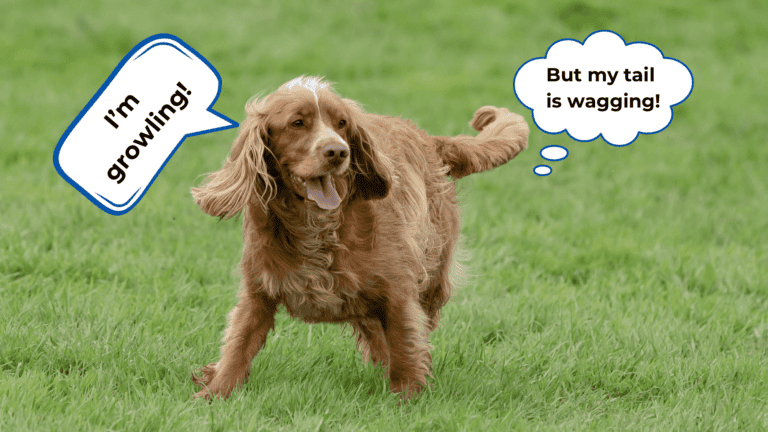
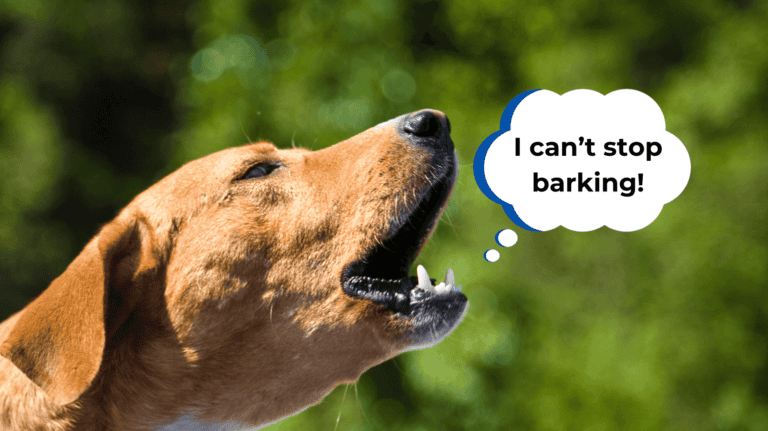

14 Responses
I have been using your techniques on a 2 year old rescue that I got about a month ago. The main problem I am having is when I try to take to isolate him or when I get up to look at what he’s barking at so I can say the second “thank you” he goes for my hands as I get up or grabs my pant leg biting and snarling as I walk him away. I am at my wits end on how to get him to stop this. He is apparently fearful and actually will bite the pant legs of any visitors who come by once they have been here a while. He will calm down and appear to be fine but as soon as someone gets up to use the bathroom or go into the kitchen he lunges and bites the pants. The rescue people told us we should throw treats away from us to change his behaviour but that hasn’t made a difference. Can you help?
Hi Kathy,
We certainly can help you with this issue and the solution is a little more complex than I can go into here. My website TheOnlineDogTrainer.com will be able to help you as we comprehensively cover how to overcome these behaviours and we can also offer individual advice via our Forum…maybe take a quick look…its a $1 trial for 3 days.
In the meantime if you have guests over I would suggest having your dog om a leash with you until he is more relaxed and you have control at all times.…all the best Doggy Dan
My Maltese is untrainable. He’s hyper, stubborn, never stops barking, marks his territory all over my house! The calming method you teach, holding the collar, does work, he spins around until he’s choking. If he gets something he’s not allowed to have he bites me when I take it away. I give up, I’m on the verge of a nervous breakdown. The vet says he’s never seen a dog like this. I honestly think he’s mentally ill
Hi Cindy,
There is absolutely no doubt that some dogs are far more challenging than others! However the really great thing is that when given the correct information, calmly and consistently their behaviour does start to improve. I have helped many owners, with similarly challenging dogs, work through their dog’s issues and the key really is to be giving the dog the RIGHT information and the right time. My website TheOnlineDogTrainer.com covers the majority of the behaviours you mention but more importantly it shows you how to achieve a calm and happy dog…maybe take a quick look…its a $1 trial for 3 days…all the best Doggy Dan
My partner and I have 3 dogs. My partner lives with mental illness, specifically anxiety and depression. Upon returning from work, I can sense from the dogs behaviour how my partner is feeling. If they respond in a very quick, active, overload of responses, my partner is feeling anxious. On other days when my dogs are slow to greet me or don’t get up to greet me, that informs me that my partner is highly depressed. The only dog that will want to leave my partner’s side is the youngest, who, as you call it, may have a very small sponge. I wonder if her reason to do that is that she just needs to have a different source to sponge from? She will usually sit by my feet or spend time following me around looking for ways to look into my eyes and get affection. Could this be her just needing a break from the other rather depressed energy or is she indicating to me that I am in need of cheering up? I always find that our quiet, chilled out time together seems to make both of us feel better. Either way, the attention that we are able to give each other benefits both of us. I’d love to hear any insights you may have and if you have any other stories to share regarding dogs and their humans with depression.
Hi Lynelle,
It sounds like you have a really amazing group of dogs in your family. In many situations, especially when it comes to emotions, it can be very difficult to say just how intelligent dogs are in this respect. Personally I do believe that dogs are far more evolved in this area than we give them credit for and so it’s really difficult to attribute reasoning to their behaviour with 100% accuracy. No doubt all of your dogs are attuned to both you and your husband’s emotional state and when they detect a change they will respond accordingly. It may be that your younger dog feels that the older dogs have your husband covered and so she is gravitating towards you to ensure you are also ok, or she may be trying to ‘read’ you in the context of the situation, or she may just have bonded with you more than your husband. Your dogs will have their own dynamic together, working together to ensure everyone is taken care of in times of unease. They really are amazing animals and family members. Thanks for sharing…..All the best, Dan
I have brother an sister 4 month old..stressful…they are always biting body slamming each other..training has worked so far with grandkids not getting hurt but occasionally male winds up nipping kids pretty good..how do I calm them when children arrive as not to jump scratch an nip..they are young so it’s also scarey to kids..as the day goes on its wonderful..it’s initially scarey at 5/8
Hi Regina,
The easiest way to ensure everything goes calmly when guests or grandchildren arrive is to place your puppies on a leash and ask your grandchildren to wait for them to calm down before they say ‘hi’. Just explain you are trying to teach your puppies some manners around guests, if you give children a good reason why then they are generally happy to co-operate. Once you feel that your puppies have relaxed and calmed down you can allow them off-leash or even leave their leash attached and just let go of it. This will make it easier if you do need to quickly gain control of them if they start to get too excited. Also be aware that young puppies do tend to feed of excitement and it can wind them up to a point where they lose control a bit. So step in and remove your puppies if they start to get to a point where their excitement is reaching a limit. Take hold of their leashes, wait for them to calm down a bit and then you can decide if you think they will be ok to go and play again. If you are consistent then your puppies will learn what kind of play is allowed and what isn’t but remember to remain calm and don,t make too big a fuss of their behaviour, actions speak louder than words here. Hope that helps….Doggy Dan
so whatever happened with the dog that would go crazy outside because of the woman being a police officer? how was that corrected?
The two main things were to 1. Identifying and recognising that the ladies actions, feelings and emotions were effecting the dog. Then helping the be aware of being calm as she left for the walk, clearing negative thoughts, breathing fully and being more relaxed about it. 2. Ensuring that in and around the house the dog knew that the lady was in charge of all the big decisions including protecting the property. This made it easier to then carry this role on when they were out on the walk. The dog could relax and the lady was in charge, keeping an eye on things. Hope that makes sense. Cheers Dan
I call BS. Hubby and I are both very laid back and relaxed. The dogs on the other hand seem to think everyone who comes to the door is a threat.
We’re just about past calm corrections, they’re about to get swatted with something soft so they know what they’re doing is wrong. And they do seem to understand that!
Hi Connie, I have found that many times when we give our dogs “corrections” and think we are doing it calmly without emotion and frustration it is actually adding energy to the situation. Something you may want to try is using timeout as a consequence of their actions without saying a word. The other thing to consider is that they may think it is their role to be protecting the property. Regards Dan
Doggy Dan,
I just spent two days training my 8-pound, female Coton de Tulear, BiBi, in Vermont, USA with Kevin Behan, who wrote: “Your Dog is Your Mirror.” Are you familiar with his training methods? BiBi has fear aggression and I am trying to help her become more calm. Via your training, which I did last summer, she made enormous improvements. However, I am eager to see if I can help her feel more comfortable and calm around other dogs.
I would appreciate hearing your thoughts about Behan’s theories and work.
Best,
Victoria (Riccardi)
Hi Victoria, I did wonder if anyone would make a connection to Kevin’s book which I have on my shelf at home. I have read it and found some really interesting points that really resonated with me. In terms of his actual dog training I have no real idea what he does or how he works, (the book did not focus on how to train your dog in that respect) so I cannot comment. What I can say is that I have found that whatever “pure training style” you prefer it always seems to be more effective if you put the 5 Golden Rules in place first. That is the key to success, and then taking it slowly, usually with fearful dogs we tend to rush it. Here is a post that may help you… https://theonlinedogtrainer.com/fear-aggression-training-the-amazing-ability-for-dogs-to-change/
Hope that helps, regards Dan